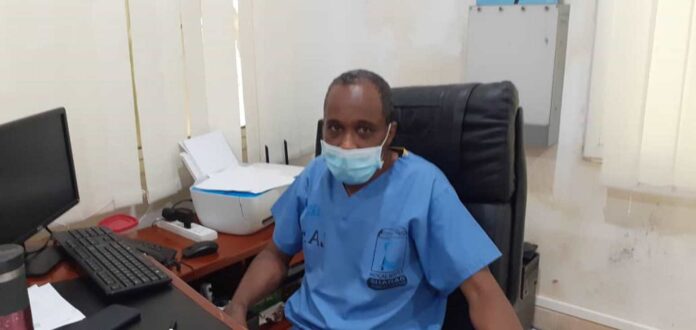By Ndey Sowe
Dr. Abubacarr Jah, a consultant, urologist and surgeon, has recently revealed that more work needs to be done in a bid to end Female Genital Mutilation (FGM) in The Gambia and other parts of the world.
The medical doctor said most of these cuttings are done in un-conducive environment which can cause a lot of infections such as HIV among others.
“More than two hundred million women alive today are living with FGM in Africa and the Middle East. Each year about more three million people undergo or are at risk of undergoing FGM, so we have a lot of work to do,” he said.
Dr. Jah, who is also the CEO of Sharab Medical Center, said FGM has no medical use at all or benefit. He said it has lots of bad side effects which includes, severe bleeding, live threatening infections like tetanus, problems in urinating, and child birth complications.
Dr. Jah said: “I want to say clearly FGM has no medical benefit, no religious basis, it is a serious crime and dishonorable to human life, it should be stopped,” he said, adding that in most cases the tools used for cutting are not clean.
Dr. Jah explained that FGM includes any procedure that is done intentionally to cause injury to the female genital organs for non medical reasons. He said it was and is still difficult to talk about FGM and issues dealing with the genitals or sexual reproductive issues in Gambian societies.
The health specialist said before people understand what FGM does they must understand the female reproductive organs.
“The male and females have things that look alike and in the female genital organ, there is something called the clitoris which represents the phallus in males, and this is where a lot of de-sensation for sexual gratification takes place, and just underneath it, is the opening for the urinary tract. When there is a cut you might also affect the urinary tract,” he said.
He said in some cases, it is part of the clitoris that is cut, and in other cases it is the labia minora (which is the minor lip) which is cut. He said type 3 is called infibulation (This is the ritual removal of the external female genitalia and the suturing of the vulva). He said the idea of performing infibulation is to preserve the virginity of girls until they are married, and they have to undergo through another procedure where it will be cut again and reopen, is a painful experience when having sex.
“This procedure is done without any anesthesia and without any pain killers and it has to be reopened again, and when it is reopened sometimes it is not to a very good extent and child birth becomes a big problem,” he said.
“I had a personal experience a few years ago, where a girl about nineteen years was brought to me unable to pass urine and her bladder was full up with urine, because the opening for her to pass her urine was cut off and her bladder was full until she looks like a pregnant woman, and she cannot release that urine.”
Dr. Jah said the reason for the girl to go through FGM was because she could not get a child for about two year and she was convinced that if she did not do the cut, she would never get a child.
The sad part was that the person doing the cut used a razor blade, he added.
Dr. Jah said when the opening of the urine is tight, the individual will get a lot of problems passing urine and there will be a lot of urinary tract infections. He said the individual may even end up having kidney infections or end up losing her kidneys when she becomes an adult.
“In the Gambia, where half of the people have their cut before one-year old, it causes serious implications because at this age, the child has no choice but to go through this painful procedure,” he said.
He said luckily in The Gambia, doctors are not involved in FGM, and should remain that way. He urged health personnel to educate people about the implications of FGM.
“Most of the circumcisers are traditional practitioners rather than medical practitioners, and about forty-five to fifty percent of women generally do not accept or think that FGM should stop, and there are also some people who want it to continue,” he said.



















